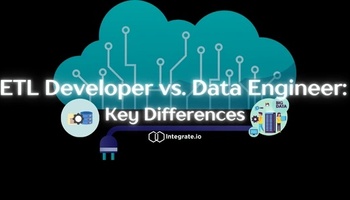- Big Data Problem #1: You Find Compliance a Challenge
- Big Data Problem #2: You Have Low-Quality/Inaccurate Data
- Big Data Problem #3: Your Data is Vulnerable to Cybercriminals
- Big Data Problem #4: You're Stuck in a Sales Slump
- Big Data Problem #5: Big Data Solutions are Just Too Expensive
- How Does Integrate.io Solve These Problems?
5 Common Big Data Problems
- Big data tools make it difficult for users to comply with legal and security frameworks.
- Businesses have low-quality and inaccurate data that serves little purpose.
- Big data is vulnerable to cybercriminals.
- Businesses using big data are still stuck in a sales slump.
- Most commercial big data solutions are just too expensive.
Big data is a breakthrough for businesses, and it's growing at an unprecedented scale. (The world produces 2.5 quintillion bytes of data every single day!) Big data solves all kinds of problems:
- It saves money
- It improves productivity
- It simplifies workflows
- It boosts sales
- It provides you with unparalleled insights and intelligence
However, big data also causes a lot of problems. Companies need to use the right data integration methods to extract, transfer, store, and analyze all this unstructured and structured data. Otherwise, all this data is just useless.
Here are some of the most common big data problems right now — and how to solve them.
Big Data Problem #1: You Find Compliance a Challenge
Complying with security and governmental regulations in your jurisdiction is important. You could face fines or even prosecution if you don't adhere to data collection/protection, tax, and other legal regulations. It's important to stay compliant with regulations such as SOC 2 and GDPR, for example.
The problem is, some big data integration tools just aren't built for compliance. Data algorithms and statistical practices don't always take into account the relevant legislation and security frameworks that protect sensitive data.
Recommended Reading: 17 Best Data Integration Platforms
Big Data Problem #2: You Have Low-Quality/Inaccurate Data
Low-quality, inaccurate data is a major hurdle for businesses of all sizes. In most cases, businesses don't get any value from this data. It's a waste of time and resources. Data with inconsistent formatting, for example, is difficult to use for statistical purposes. Duplicate data, on the other hand, confuses sales, marketing, and customer service teams.
Sometimes data becomes low-quality during the ETL stage, where businesses extract, transfer, and load data from one system to another. Data becomes "spoiled" and no longer provides value. Investing in a good-quality data integration tool prevents this from happening.
Big Data Problem #3: Your Data is Vulnerable to Cybercriminals
Big data is all well and good, but where do you keep it? And what happens if it gets in the wrong hands? Data theft is on the rise, and experts predict businesses will lose $6 trillion to cybercrime by 2021.
Many data integration tools fail to safeguard important information, and this exposes businesses to lawsuits and jeopardizes customer trust. In today's world, you need a data platform that you can rely on to protect your customers' valuable information. The most effective data integration tools utilize cloud technology so you can store data in a safe, secure environment at all times.
Big Data Problem #4: You're Stuck in a Sales Slump
Sales are down. Profits have plummeted. You've hit a slump. This might happen to your business without a moment's notice.
Big data provides you with unparalleled insights into your current business strategies so you can streamline sales efforts. However, not knowing what to do with this data (or using the wrong tools) often results in lost sales. Usually, you're targeting the wrong people or using the wrong data completely.
The best data integration tools collect valuable big data insights from various sources. Using these tools improves your sales strategies in the following ways:
Understand Your Prospects Better
Big data provides you with valuable intelligence about prospects in your sales pipelines — where they come from, what they want, and when they are likely to make a purchase. All of this data helps you make smarter business decisions.
- With the right big data, discover where customers are in the sales lifecycle and target them at the right time with the right marketing materials.
- Use big data to personalize interactions with prospects.
- Improve engagement at all touchpoints in the customer lifecycle.
- Build customer loyalty and further increase sales.
Understand Existing Customers Better
It's not just new customers you need to worry about. If you're stuck in a sales slump, you must improve engagement with your current consumers too. The best big data platforms help do this by allowing you to do the following:
- Use big data to up-sell/cross-sell products to current customers.
- Discover customers that provide the most lifetime value.
- Keep existing customers engaged post-purchase with the right marketing materials and methods.
- Increase customer retention rates and boost sales.
Create a Centralized Sales Database
By centralizing all of your sales data into one system, you can generate more accurate insights and maximize sales strategies.
- With a centralized sales database, you get more accurate and timely big data intelligence.
- Centralize all sales tools and metrics — CRM, customer support tools, sales tools, you name it.
- Save time and increase productivity with one system instead of using multiple pieces of software.
- Integrate data sources for more useful insights and analytics.
- Avoid duplicated data and out-of-date information.
Big Data Problem #5: Big Data Solutions are Just Too Expensive
Many companies who require big data face the following dilemma:
- Should you use free, open-source tools and save money, or
- Should you pay lots of money for commercial tools?
Many big data solutions are too expensive and require a costly license or subscription. Open-source tools, on the other hand, lack the type of features that businesses need.
Is there a happy medium?
Related Reading: The Top 7 ETL Tools
How Does Integrate.io Solve These Problems?
As big data develops, businesses should invest in the right integration tools. Otherwise, they will fail to adhere to compliance requirements, expose sensitive information to cybercriminals, jeopardize sales, and risk data quality. Integrate.io is a data integration, ETL, and ELT tool that provides you with the insights you need at this unprecedented time. Move data, transform data, centralize data--and with a flat-fee pricing structure, you can be confident that your costs will not spiral out of control due to unpredictable data volumes. But don't take our word for it! Schedule an intro call for a 7-day risk-free pilot and experience the Integrate.io platform for yourself.










